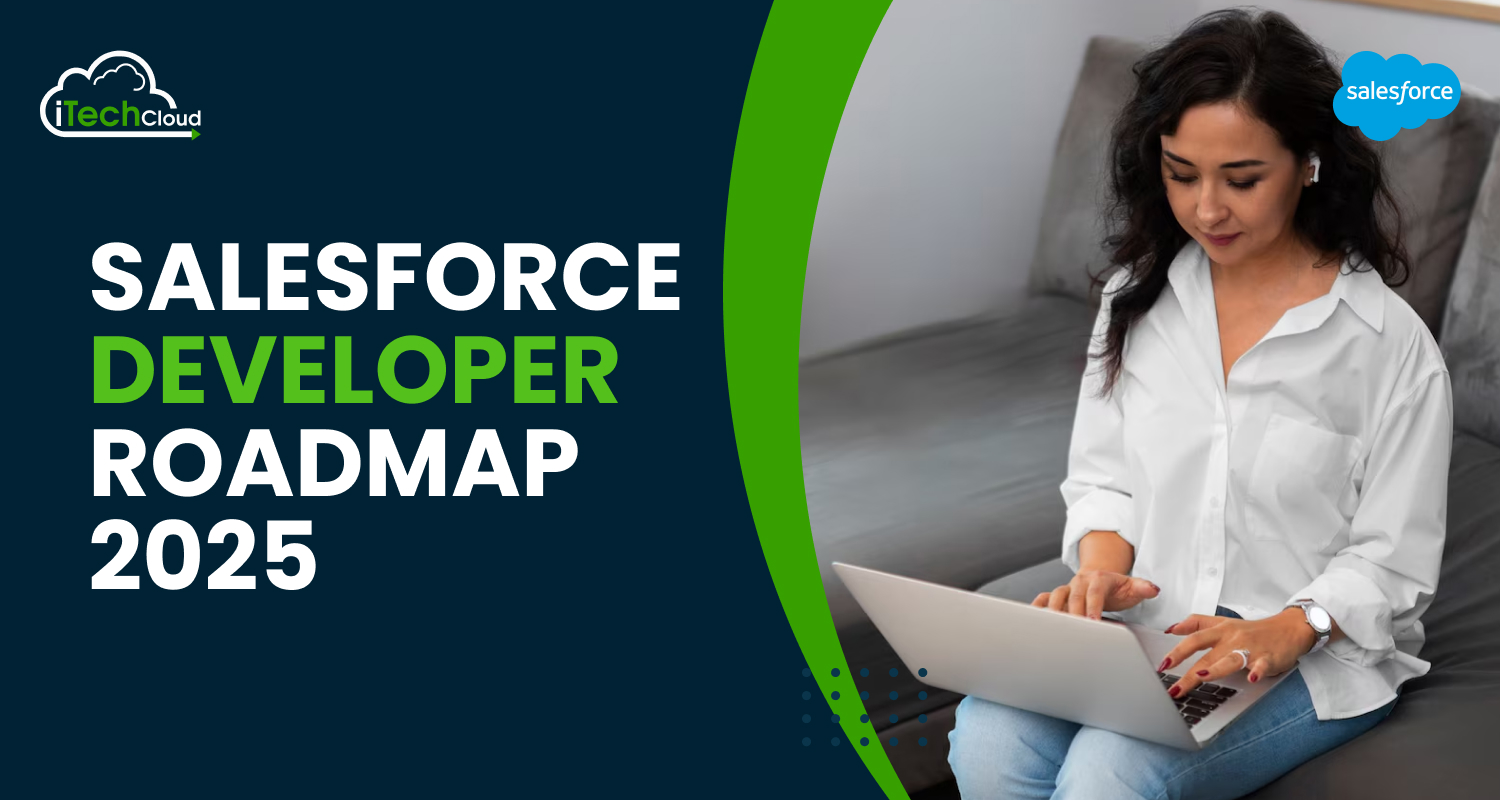Salesforce has become one of the most in-demand cloud platforms, providing solutions for customer relationship management (CRM) and enterprise applications. As companies continue adopting Salesforce, the demand for skilled Salesforce developers is at an all-time high. Whether you are a beginner or an experienced developer looking to advance your skills, this roadmap will help guide your journey in 2025.
Who is a Salesforce Developer?
A Salesforce Developer specializes in developing and customizing applications on the Salesforce platform using tools like Apex, Visualforce, and Lightning Web Components (LWC). They work closely with administrators, architects, and business teams to implement solutions tailored to business needs.
Prerequisites to Becoming a Salesforce Developer
Before diving into Salesforce development, it is essential to have a basic understanding of:
- CRM concepts: Understanding customer relationship management principles.
- Programming basics: Knowledge of OOP (Java, C#, or Python helps).
- SQL and databases: Understanding of data modeling and queries.
- Web technologies: Familiarity with HTML, CSS, and JavaScript.
Step-by-Step Salesforce Developer Roadmap 2025
Step 1: Understand Salesforce Basics
Before diving into development, you need a strong foundation in Salesforce.
1. Learn Salesforce Platform Basics
- Explore Salesforce Trailhead to learn the core concepts.
- Understand the Salesforce ecosystem and its various clouds (Sales Cloud, Service Cloud, Marketing Cloud, etc.).
- Get familiar with Salesforce AppExchange and its role in extending platform capabilities.
2. Learn Salesforce Configuration & Administration
- Understand Profiles, Roles, and Permission Sets.
- Learn Object Manager (Custom & Standard Objects, Fields, Relationships).
- Master Validation Rules, Workflow Rules, and Process Builder.
- Explore Flows for automation.
Step 2: Learn Salesforce Development (Apex, LWC, SOQL)
Once you have a good grasp of Salesforce administration, the next step is development.
1. Master Apex Programming
- Learn Apex syntax and concepts (variables, loops, conditions, classes, triggers, etc.).
- Understand Governor Limits and best practices.
- Practice writing Apex Triggers, Batch Apex, and Scheduled Jobs.
- Learn about Asynchronous Apex (Future Methods, Queueable, Batch, and Scheduled Apex).
2. Learn SOQL & SOSL
- Understand Salesforce Object Query Language (SOQL) for data retrieval.
- Learn Salesforce Object Search Language (SOSL) for full-text searches.
- Practice writing efficient queries to stay within governor limits.
3. Explore Lightning Web Components (LWC)
- Learn HTML, JavaScript (ES6+), and CSS.
- Understand the LWC framework, component lifecycle, and event handling.
- Explore Apex integration with LWC.
- Use SLDS (Salesforce Lightning Design System) for UI consistency.
Step 3: Explore Advanced Development Topics
After mastering core development, explore advanced topics.
1. Learn Integration (REST & SOAP APIs)
- Understand REST API and how to make API calls using Apex.
- Explore SOAP API and when to use it.
- Work with OAuth 2.0, Connected Apps, and Authentication mechanisms.
2. Master Deployment & DevOps
- Learn Change Sets, Metadata API, and ANT Migration Tool.
- Explore SFDX (Salesforce Developer Experience) and CI/CD pipelines.
- Get hands-on experience with version control tools like Git.
- Implement Automated Testing & Code Reviews.
3. Work with Salesforce Platform Events & Pub/Sub
- Understand event-driven architecture in Salesforce.
- Explore Platform Events, Change Data Capture (CDC), and Pub/Sub API.
Step 4: Get Certified
Salesforce certifications validate your skills and increase job opportunities.
Beginner-Level Certifications
- Salesforce Certified Administrator
- Salesforce Platform App Builder
Developer Certifications
- Salesforce Certified Platform Developer I (PDI)
- Salesforce Certified Platform Developer II (PDII)
- Salesforce JavaScript Developer I
Advanced Certifications
- Salesforce Certified Application Architect
- Salesforce Certified System Architect
- Salesforce Certified Technical Architect (CTA) [Expert-Level]
Step 5: Work on Real-World Projects & Contribute to the Community
- Build projects on Salesforce Developer Edition or Trailhead Playground.
- Contribute to open-source Salesforce projects on GitHub.
- Join Salesforce Developer Forums, Trailblazer Community, and LinkedIn Groups.
- Participate in Salesforce hackathons and events like Dreamforce.
Step 6: Stay Updated with Latest Salesforce Trends
Salesforce is an evolving platform, so continuous learning is essential.
- Follow Salesforce Release Notes (Spring, Summer, and Winter releases).
- Subscribe to the Salesforce Developer Blog & YouTube channels.
- Explore new Salesforce tools like Einstein AI and Hyperforce.
Career Opportunities for Salesforce Developers in 2025
With Salesforce adoption growing, career opportunities are abundant.
Roles & Salaries
- Salesforce Developer: $85K – $130K
- Salesforce Consultant: $90K – $140K
- Salesforce Architect: $120K – $200K
- Salesforce Technical Lead: $110K – $180K
- Freelance Salesforce Developer: $50 – $150 per hour
Top Industries Hiring Salesforce Developers
- IT & Software
- Healthcare
- Finance & Banking
- E-commerce & Retail
- Telecommunications
Conclusion
Becoming a Salesforce Developer in 2025 requires a strong foundation in Salesforce administration, Apex programming, Lightning Web Components, and integrations. Earning certifications, contributing to the community, and staying updated with the latest trends will accelerate your career growth. Follow this roadmap, stay persistent, and success will follow!


